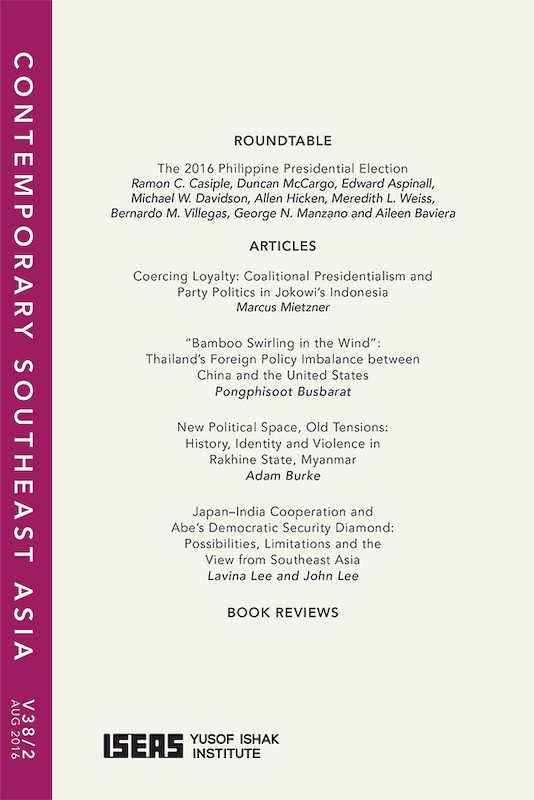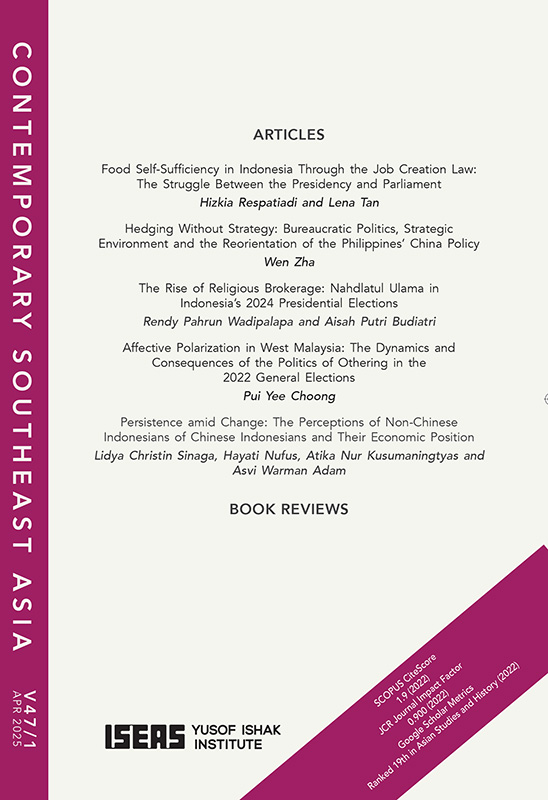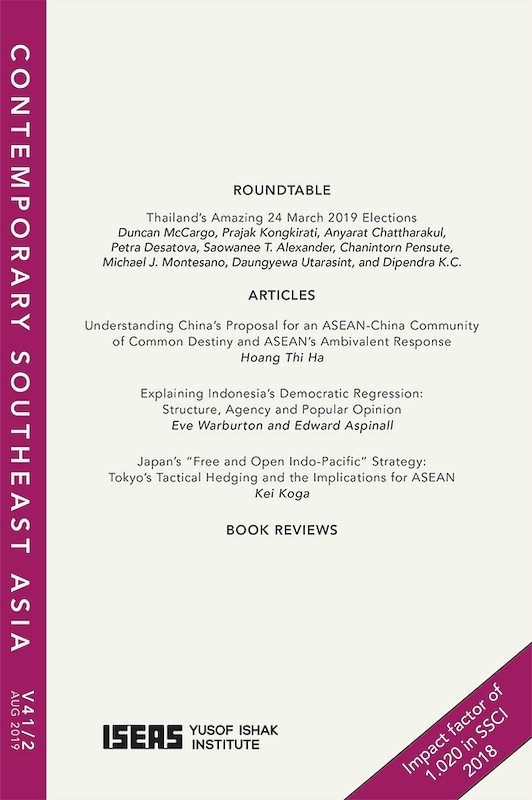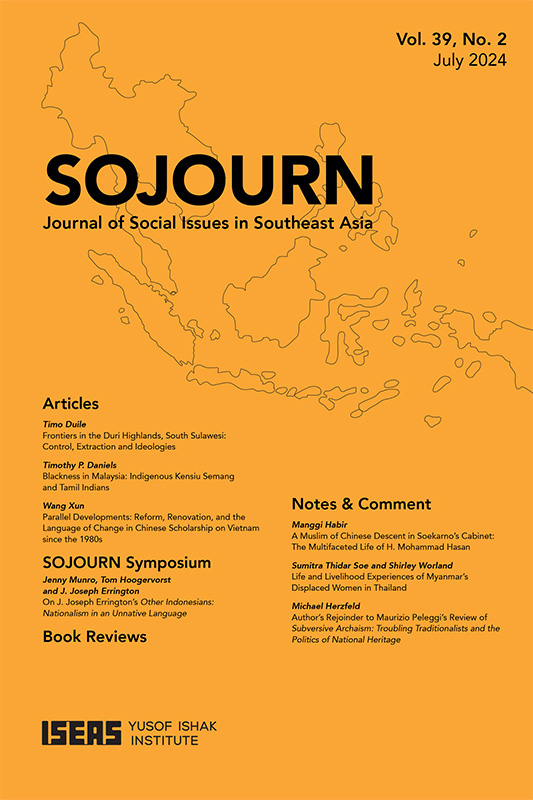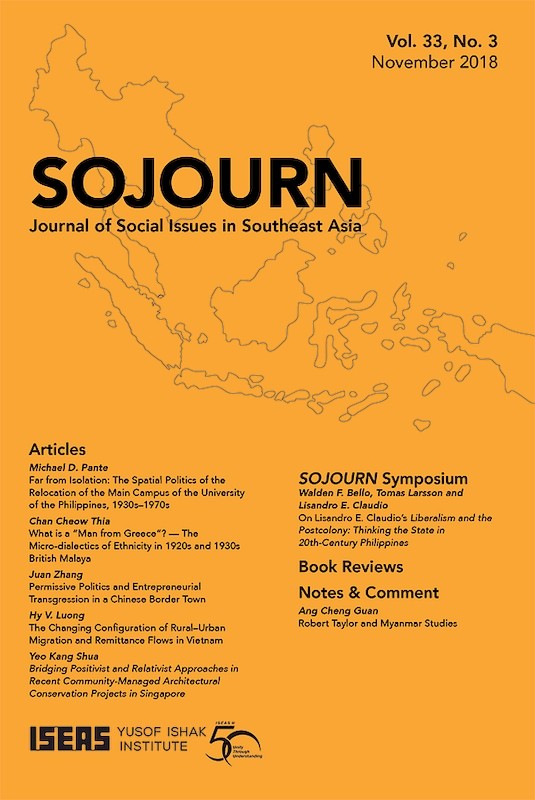Contemporary Southeast Asia Vol. 42/1 (April 2020)
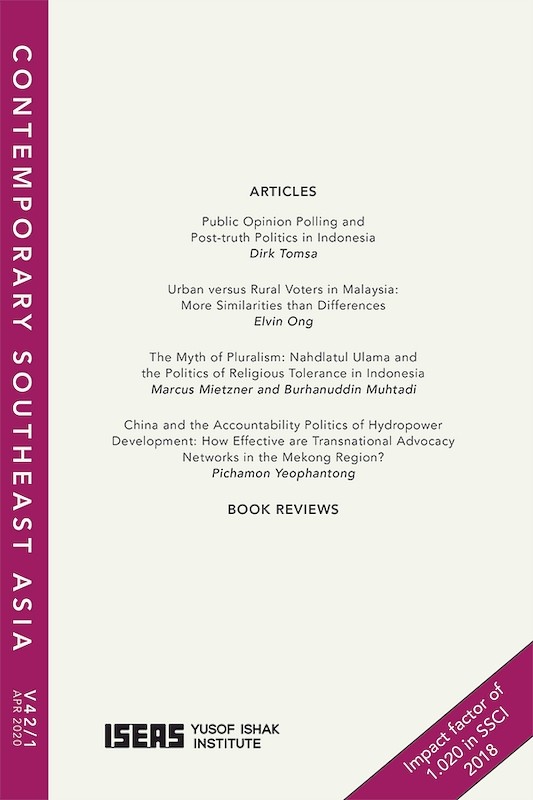
Ian Storey, editor
Date of publication:
April 2020
Publisher:
ISEAS – Yusof Ishak Institute
Number of pages:
144
Code:
CS42/1
About the publication
- Attained impact factor of 1.020 in Social Sciences Citation Index 2018
- Ranked 18th by Google Scholar Metrics 2018 in the Asian Studies and History category.
Contents
-
Contemporary Southeast Asia Vol. 42/1 (April 2020)
[Whole Publication, ISSN: 1793284X] -
Preliminary pages
- ARTICLES
-
1. Public Opinion Polling and Post-truth Politics in Indonesia, by Dirk Tomsa, author see abstractPublic opinion polling plays a prominent role in Indonesian politics, but as the country grapples with democratic backsliding and post-truth politics, pollsters have faced serious challenges in their endeavour to enhance responsiveness, representation and accountability. This article analyses how the Indonesian polling industry has responded to these challenges since the 2014 presidential elections. It argues that Indonesia’s most reputable pollsters have made important contributions to upholding the integrity of Indonesia’s electoral regime due to increased transparency and new initiatives to improve media coverage of polling. At the same time, however, democratic responsiveness seems to have declined rather than improved despite an ever-growing number of public opinion surveys, while fragmentation and politicization within the polling industry have exacerbated some of the pathologies of contemporary Indonesian politics, including the explosion of electoral campaign costs and deepening polarization.
-
2. Urban versus Rural Voters in Malaysia: More Similarities than Differences, by Elvin Ong, author see abstractIn Malaysia, ethnicity is the primary social cleavage around which politics is articulated, organized and contested. Yet, extant scholarship also suggests urbanization as an important secondary cleavage driving political conflict. Urban voters are perceived to be more politically engaged and active, and politically more liberal, as compared to their rural counterparts. They are therefore more likely to vote for political parties opposed to the Barisan Nasional. But is there really an urban-rural dichotomy in Malaysia? This article contends that the existing literature regarding urbanization’s effect on political attitudes and voting behaviour in Malaysia is fraught with theoretical, methodological and empirical challenges. Furthermore, survey data from three waves of the Asian Barometer suggests that differences with regards to political attitudes between urban and rural Malaysians diminish substantially or contradict theoretical expectations when other demographic variables are controlled for. These results suggest that scholars of Malaysian politics should be wary of findings that exaggerate urban-rural differences. Perpetuating the stereotype misleads future research, entrenches political polarization and deepens the potential for social conflict.
-
3. The Myth of Pluralism: Nahdlatul Ulama and the Politics of Religious Tolerance in Indonesia, by Marcus Mietzner, Burhanuddin Muhtadi, authors see abstractIn much of the scholarly literature, Nahdlatul Ulama (NU), the largest Muslim organization in Indonesia, is recognized as a defender of religious tolerance and pluralism. This is to no small extent the result of how NU has portrayed itself and its actions—including during the 2019 presidential elections, when it professed to have aligned with incumbent president Joko Widodo in order to keep Islamist groups from power. In this article, we analyse the attitudes of NU followers towards religious tolerance and pluralism, and find a significant mismatch between the self-perception of the NU leadership and the actual views held by the NU grassroots. Based on original survey data, we show that NU followers are generally as intolerant of religious minorities as the rest of the Indonesian Muslim population, and in some cases, even more intolerant. We argue that this is the result of NU’s long-standing prioritization of battling rival Muslim organizations (which it views as threats to its interests) over advancing substantive tolerance campaigns that could change the religio-political attitudes of its constituency.
-
4. China and the Accountability Politics of Hydropower Development: How Effective are Transnational Advocacy Networks in the Mekong Region?, by Pichamon Yeophantong, author see abstractThis article explores the ecological footprint of Chinese overseas investment in the Mekong region’s hydropower sector, and examines how Chinese dam developers can be compelled into responding to mounting external pressure and adopting policies that resonate more with responsible investment norms. It argues that an important dynamic has been the development of transnational advocacy networks within the region’s evolving public sphere. Working to renegotiate the parameters of socially acceptable conduct, civil society actors and their partners have been at the forefront of challenging the traditional development paradigm adhered to by governments in the Mekong region, effectively casting a critical light on the adverse impacts of Chinese-backed infrastructure schemes. Here, campaigns spearheaded by local and international NGOs have proved crucial to raising public awareness, as well as to sensitizing the Chinese government and its state-owned enterprises to their environmental and social responsibilities within a contested political space.
- BOOK REVIEWS
-
BOOK REVIEW: Strong Patronage, Weak Parties: The Case for Electoral System Redesign in the Philippine, edited by Paul D. Hutchcroft, by Aries A. Arugay, author
-
BOOK REVIEW: Freedoms of Navigation in the Asia Pacific Region, by Sam Bateman, by Rebecca Strating, author
-
BOOK REVIEW:Asymmetrical Neighbors: Borderland State Building between China and Southeast Asia, by Enze Han, by Zhu Xianghui, author
-
BOOK REVIEW: Indonesia: State & Society in Transition, by Jemma Purdey, Antje Missbach and Dave McRae, by Elisabeth Kramer, author
-
BOOK REVIEW: Grey and White Hulls: An International Analysis of the Navy-Coastguard Nexus, edited by Ian Bowers and Swee Lean Collin Koh, by Christian Bueger, author
-
BOOK REVIEW: Rebel Politics: A Political Sociology of Armed Struggle in Myanmar’s Borderlands, by David Brenner, by Andrew Ong, author
-
BOOK REVIEW: Southeast Asia after the Cold War: A Contemporary History, by Ang Cheng Guan., by Brendan Taylor, author
-
BOOK REVIEW: Asia’s Trouble Spots: The Leadership Question in Conflict Resolution. By A.S. Bhalla., by Zachary Abuza, author

